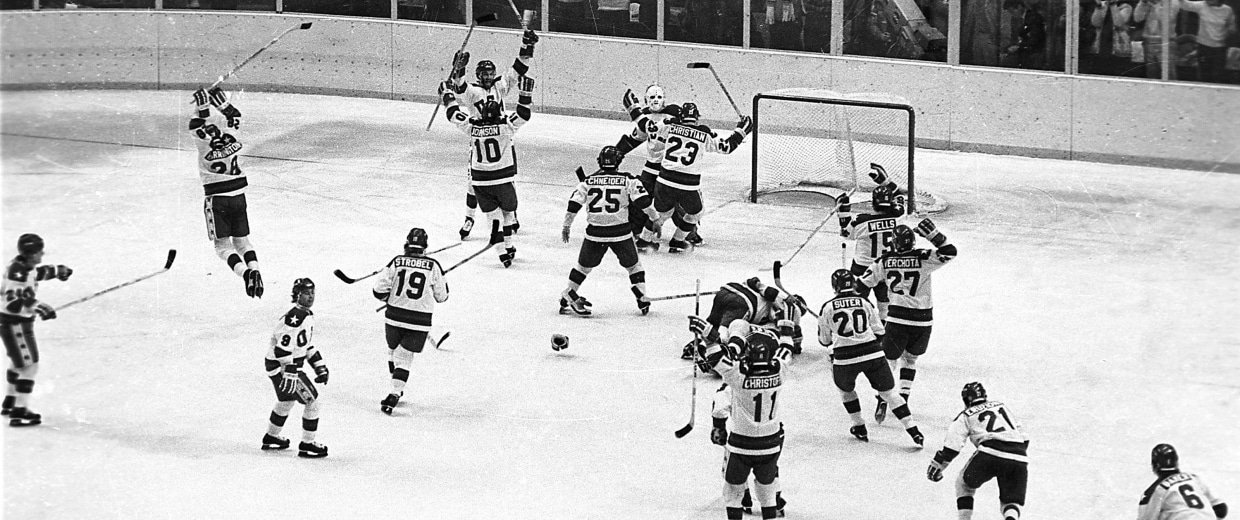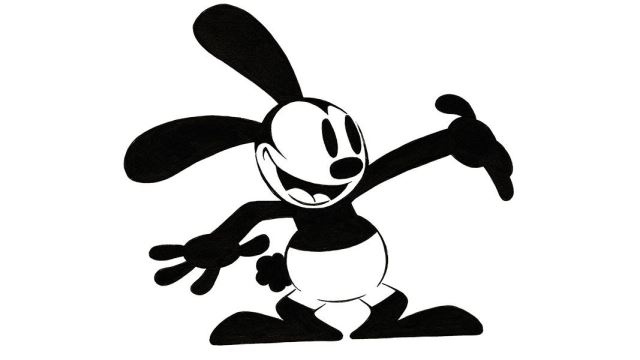“Do you believe in miracles? Yes!” Who among us hasn’t heard that perfect call when the USA Olympic hockey team shocked the Russians? The call by Al Michaels eventually led to the title of the movie about that 1980 team and what they did in Lake Placid, New York. There aren’t many broadcasters around who are in that league, where a call turns into a movie. Pretty special. Not many broadcasters have ever been traded either. Michaels was traded to NBC for a rabbit. Yes, a rabbit.

BEST KNOWN FOR:
It may be difficult to narrow down a distinguished career to one single thing Michaels is “best known for,” especially after almost 5 decades in network sports play-by-play. To me though, there were two moments that stand out above most others. Each moment displays a distinct quality in Michaels’ broadcasts that I really admire and respect.
The first should be fairly obvious. In fact, the most famous 6 words in sports, led off this column. Michaels drew the assignment of calling hockey for the 1980 Olympics in Lake Placid. He had no idea what would follow. In fact, he now jokes about how he actually drew the assignment at the hockey venue in New York.
“I had done one game and nobody else had done any,” Michaels told CNBC earlier this year before the 40th anniversary of the “Miracle on Ice” game. “I’m with the Mount Rushmore of announcers,” Michaels said. “We have Howard Cosell, Jim McKay, Chris Schenkel, Keith Jackson, Frank Gifford, Bill Flemming. And somebody had to do hockey in Lake Placid.”, he said.
“I knew what icing was. I knew what offside was,” he said. “And so that’s how I got the assignment.”, he told the cable network.
By chance, Michaels by virtue of that single game under his belt got to make that call, or should I say THE call. The explanation on where that final came from is typical Michaels, understated, capturing the moment and right on point.
“I can only tell you this: The thing came out of my heart,” Michaels said to the New York Post in January. “There was a word that popped into my head: miraculous. Miraculous got morphed into a question, and I answered it with a yes, like Marv Albert always says, ‘Yes!’ That was it.”, Michaels said succinctly. “At that particular time, I had no idea this thing would live in perpetuity as long as it has.”
That last statement to me is what separates Michaels from others. He didn’t script the call. He didn’t start screaming. He didn’t let his voice get swept up in the emotions of the building that was filled with giddy US Hockey fans.

He stayed true, even as the nail-biting game was counting itself down, Michaels continued calling the action. Then when the moment arose, he nailed it, calling an incredible moment and then letting the pictures tell the story. It’s hard to do.
The other best known involved an earthquake, a World Series and Michaels becoming a news reporter. This time he was only able to utter four words, “We’re having an earth…” before the broadcast on ABC Sports cut away. Michaels was right in a big way, the 6.9 magnitude
Loma Prieta temblor hit just as he was setting the scene for Game 3 of the 1989 game in San Francisco. The quake killed 63 people and injured nearly 4-thousand others.
“It was certainly one of the most stunning things ever. There’s no way to even think about preparing for something like that,” Michaels told Sports Illustrated. “It took place, then what you had to do when we were on the air, kind of collect your wits and stay calm. I look back on that night as a very unusual once in a lifetime event probably, something that was just extraordinary. That one was not a good memory.”
Michaels became an impromptu reporter for a national news broadcast. He remembered vividly what happened after power was restored in the broadcast booth. “The camera in the booth got power first, and we flipped it around until we saw a shot [in its monitor] from the blimp of the Bay Bridge,” Michaels recalled to SI. “That’s when I first had an understanding that even though all of us at Candlestick were O.K., the rest of the area was not.”
Michaels drew upon his 12 years living in the Bay Area, to identify the locations covered by the camera aboard the Goodyear blimp. With Ted Koppel in a studio in Washington DC, the two navigated the coverage with Michaels carefully describing what he saw and where the chaos was happening. Not out of his realm in any way. “Sports reporters are the same as news reporters,” he said. “We present the story, assess situations and articulate emotions. The same basic principles apply.”
He did what he could and wasn’t without mistake, but he was certainly on his game, albeit a different game than he was used to covering. “Kids always ask me how to get to this point in broadcasting,” he said. “I tell them to pay attention to everything that happens in the world. Sports often is more than the hit-and-run, stolen bases and three days’ rest.”
I know I talk a lot about ‘versatility’ and usually I mean, the ability to call different sports well or to be able to host a show too. This time, versatility kind of means the ability to adapt to what is going on around you and despite it not being a comfort zone, coming through when needed. Michaels did that in both cases, two memorable calls on much different ends of the spectrum. Truly grace under pressure.
WHY IS HE SO GOOD?
Lots of reps will certainly help you perfect your craft and he’s had plenty of those has Al Michaels. But that’s not what makes him so good in my book. Michaels possesses a quality that many broadcasters seek.

He always has “command” of his broadcast. Michaels can sense moments and when he needs to be talking and when he can defer to his analyst. He seems to be able to sniff out big moments in broadcasts and still has the ability to treat an obligatory 3-yard run with the same respect. A broadcast never gets away from Michaels, it may seem like it at times, because of his sarcasm and sense of humor, but trust me that’s all him knowing what the moment needed. Michaels’ ability to drop in some humor here and there is great. Whether it be a pop-culture reference or one involving the spread of the game or the over/under. I think people enjoy those moments as much as anything he does.
Michaels has an incredible knowledge of each game he covers. You can tell in some instances that he already has the grasp on a question he’ll ask an analyst during a game. That ability allows the play-by-play man to either think right alongside his color commentator or nudge him/her to that point. It’s seamless. If you didn’t know it, you could never tell.
It doesn’t really matter who he’s working with. Whether it be John Madden, Jim Palmer, Tim McCarver, Cris Collinsworth, Dan Dierdorf, Frank Gifford, Dan Fouts, Dennis Miller, Hubie Brown, Tommy Lasorda or Howard Cosell, he worked with them seamlessly.
Michaels’ resume would take up the rest of this webpage all by itself. Suffice it to say, he’s done everything from, local baseball for the Reds and Giants, The Olympic Games, Super Bowls, World Series games and the NBA Finals. Michaels has also hosted coverage of The Kentucky Derby, Preakness and Belmont Stakes, The Indy 500, Stanley Cup Finals and the Olympics as well. Having any one of those things under your belt alone would be noteworthy. The man has done it all and done it all very well.
Last but certainly not least, there was that trade, involving Michaels and a rabbit. Ok it was a cartoon rabbit. When Michaels joined NBC to broadcast Sunday Night Football in February of 2006, ABC and NBC struck a deal to let Michaels out of his remaining contract. NBC Universal sold ESPN the cable rights to 4 Ryder Cups, also granted ESPN more usage of Olympic Highlights and sold to parent company Disney the rights to Oswald the Lucky Rabbit. Oswald was a cartoon character developed by Walt Disney himself which he lost in 1928. It was previously owned by Universal Pictures which is under the NBC umbrella.

Michaels joked about the “trade” saying, “Oswald is definitely worth more than a fourth-round draft choice. I’m going to be a trivia answer someday.”.
I think NBC got itself a steal of a deal, acquiring one of the all-time greatest voices in sports.
Andy Masur is a columnist for BSM and works for WGN Radio as an anchor and play-by-play announcer. He also teaches broadcasting at the Illinois Media School. During his career he has called games for the Chicago Cubs, San Diego Padres and Chicago White Sox. He can be found on Twitter @Andy_Masur1 or you can reach him by email at Andy@Andy-Masur.com.



